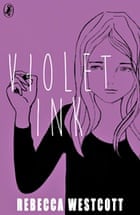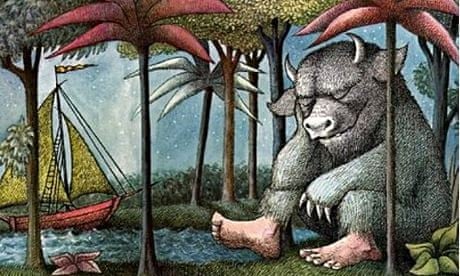How dark is too dark? The row about Kevin Brook's Carnegie winning The Bunker Diary earlier in the summer really got people thinking about this question.

Someone was talking to me recently about the plots of both my books. "They're very dark stories, aren't they?" he said. For just a moment I wasn't sure what to reply, but thankfully, my brain switched into gear in the nick of time.
"Err, no," was my intelligent, insightful response. It was a bit of a conversation ender. The discussion of what topics are deemed appropriate and acceptable in children's literature is certainly not a new one. In 1963, Maurice Sendak's Where The Wild Things Are was banned from many schools across the United States – it's depiction of an unruly boy who defies his mother was seen as upsetting and potentially damaging to sensitive young readers.
More recently, the subject of age banding for children's and young adult books has been heavily debated, both in the media and across social networking sites. Those in favour believe that children's fiction pushes boundaries that aren't appropriate for all readers. Those against talk about restricting children's choices and alienating readers with a younger reading ability than their chronological age.
The truth is surely a combination of the two. All books are not suitable for all readers. As an adult reader, there are some books that I will never read because I know that I will struggle to deal with the subject matter. A few years ago a colleague recommended that I read We Need To Talk About Kevin by Lionel Shriver. An amazing, well-written, powerful novel with a cracking storyline – and also the book that has most deeply affected me and left me with mental images that I can't forget. I strongly wish that I hadn't read this book but the damage has been done – I can't now unread it. I've not seen the film but I doubt that it could come close to conjuring up the disturbing, traumatic images that Shriver's words created in my head.
But that's just me. Which is kind of my point. Reading is an individual, independent affair and the things that impact on me may be completely bypassed by someone else. So if we start categorizing books as appropriate for readers of certain ages, we are running a huge risk of missing wonderful opportunities for discovery and exploration. And children are fantastic at self-policing their own reading. They know what they can handle. One of my sons wanted to read the Harry Potter books because he enjoyed the adventures and excitement. What he didn't feel ready for was the emotional storyline and, after reading the first book, made the decision to read the rest out of sequence. A bizarre choice – but it meant that he could relax and not feel worried about losing himself too deeply in Harry's world. That isn't to say that adults shouldn't be supporting children with their book choices. Conversations about books and an awareness of the books that are being read by a child are only ever going to be a good thing. A book that addresses the subject of death might be too much for a reader who has recently gone through a bereavement – but for another, it could be exactly what they need. A close adult can help guide a young reader towards the books that they are ready to read.
Children's fiction is constantly evolving and a question often posed is: Is there anything that we shouldn't write about when we write for children? Is there any subject that is off-limits? If we include YA in this question then I think that the answer is probably: no. If it happens to people and it happens in families and it's a part of life – then it's probably been or being written about for children.
I believe that this is a good thing. Children live in families; they are surrounded by adults with all their adult problems. They wake up every morning in homes where there are everyday crises and challenges. They hear their friends talking and they watch the news on TV. Life happens and they are a part of that. Their books need to reflect what they hear, what they see. They need to recognise their situations in a book.
But like adults, children don't just want to read about themselves. Books that address challenging issues can offer opportunities to explore, to ask of yourself: "what would I do?" In the same way that millions of people watch hospital dramas and imagine themselves as part of the action, books provide children with the chance to empathise. They can play out a role in a safe environment. They can learn about how other people think.
Children's writers need to take care when they write about everyday, real-life situations and the majority approach this tricky task with sensitivity and a huge awareness of their responsibilities. The challenge is to portray the complex situations faced by children in a way that can be accessed by the reader at a level he/she is ready for. Death and guilt are both subjects in A Monster Calls, dealt with by Patrick Ness in a manner that is powerful and poignant, while Auggie, the main character in Wonder by RJ Palacio has to contend with the constant feeling of being different to his peers due to severe craniofacial deformities. This is a book that addresses children's (and adults) preconceptions, presenting Auggie as a spirited, courageous but ultimately normal child.
Maurice Sendak said, in an interview in 2002: "The question I am obsessed with is: how do children survive?" 21st Century children are not the first to deal with dark times and difficulties but in a fast moving society, it is surely only right that we provide as many opportunities as possible for children to make sense of the world they live in?
What do you think about Rebecca's views. Do you think it's right that children and teens should self-police the books they read, or would you rather children's books were more heavily vetted or labelled. Have you ever read a book you wish you hadn't because it disturbed you too much? Let us know by emailing childrens.books@theguardian.com.
Rebecca Westcott's second novel, Violet Ink in available in the Guardian bookshop.
Your responses
Alice
I read Roald Dahl's My Uncle Oswald at age 13. My mother had bought it for me without realising it's actually a book for adults about the creation of a very special sperm bank… Well, I'm glad that book happened into my hands. I was fascinated. It's a brilliant, hilarious story that is full of surprises. I read it in one afternoon with a friend, tucked away in my bedroom, giggling, rushing through it because we suspected it might be a forbidden read. I will never forget it.
Andréanne
I have read The Little Girl Who Was Too Fond of Matches by Gaétan Soucy and I wish I hadn't but I still think children should have access to all kind of stories and all kind of writing styles and subjects because there are all kinds of children who live all kinds of lives and therefore have all kinds of needs.
Lisa
This article infuriates me simply because the discussion never ceases to exist. Who is anyone to take the role of Literary Police and declare the rights and wrongs where consumption of material is concerned regardless of age group? It's frustrating seeing books at Scholastic Fairs separated by age, as if it were an example of gross misconduct to have children at the age of 10 read anything outside of their assigned age bracket. What kind of a world are we aspiring to live in? Some perversion of a totalitarian society in which everything we do is dictated by someone set above us? Because that's what this ultimately boils down to.
